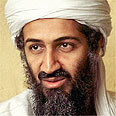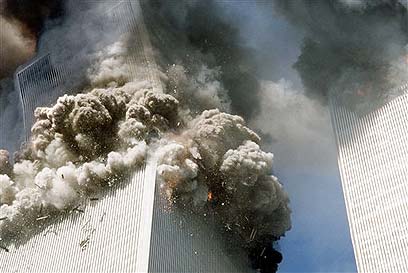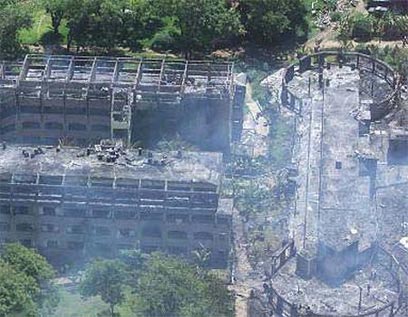
Founded in 1988 by Osama bin Laden, a Saudi millionaire turned radical Islamist, al-Qaeda's declared a Jihad – holy war – on all "anti-Islamic" governments in Muslim countries and fights "the enemies of Islam", namely the United States and Israel.
The organization was originally based in Sudan and sanctioned by the county's Muslim regime. Al-Qaeda's first years were dedicated to recruitment, armament, training and creating terror cells around the world.
First steps in world terror
Al-Qaeda's first official strike soon followed: In February of 1993, the organization attempted to bring down the World Trade Center towers for the first time, using a truck bomb. The bomb was supposed to break the foundation of Tower One, knocking it into Tower Two, bringing the entire complex down. The towers were severely shaken by the explosion, but the foundation held up. Six people lost their lives and over 1,000 others were injured.
On November 13 1995, a car bomb exploded in the Saudi Arabia capital of Riyadh, targeting a joint US-Saudi military training center. Seven people were killed and 60 injured.
Osama Bin Laden praised the attack, but al-Qaeda never officially claimed responsibility for it.
In 1996, and after being pressured by the international community, the Sudanese government banished Bin Laden and his operation from Sudan. The organization moved its base of operations to Afghanistan, where it was sanctioned by the Taliban's regime.
In August 1998, al-Qaeda bombers targeted the US embassies in Kenya and Tanzania, killing 300 and injuring 5,000. the attack, said the organization, was in retaliation to a US Military attack on al-Qaeda basis in Afghanistan.
In October 2000, al-Qaeda struck the USS Cole, a missile destroyer docked in Yemen, killing 17 US soldiers. Soon after that the organization was linked to foiled attempts on the lives of the Pope, during a 1994 manila visit; former US President Bill Clinton during a visit to the Philippines in 1995; and a failed bombing attempt at LAX airport in Los Angeles.
Al-Qaeda commanded the international community's attention on September 11, 2001, when its operatives kidnapped for commercial airplanes, crashing two into the World Trade Center towers, one into the Pentagon and the forth in a Pennsylvania field.

Towering inferno. The World Trade Center on 9/11 (Photo: AP)
The attacks claimed the lives of 3,000 Americans; its sophistication, death toll and collateral damage branding al-Qaeda the world's most dangerous terror organization.
In the aftermath of 9/11, US President George W. Bush declared a war on terror and a global manhunt after Osama Bin Laden.
The United States soon invaded Afghanistan and toppled the Taliban's regime, but was unable to capture Bin Laden.
No clear signature
No one knows how al-Qaeda really operates. The various Western intelligence agencies believe the organization is made up of independent terror cells, operating out of 45 different countries around the world.
Bin Laden serves both as the organization's military and spiritual leader, handing down al-Qaeda's ideology and singling out targets for the various cells to hit.
Alongside Bin Laden, al-Qaeda has a high council in place: The Majles a- Shura debates ideological issues and gives the go-ahead for large scale terror attacks.
The Majles a- Shura also oversees four sub-councils, which are in charge of various operational issues, such as finances, media relations, supplies and strategy.
Bin Laden is also known for supporting other, smaller, Muslim terror groups, which operate independently, receiving al-Qaeda funds, but not its operational orders.
This flexible organizational structure prevents al-Qaeda from having a clear operational signature making the organization even more illusive.
Despite considerable efforts by the international intelligence community since 2001, Bin Laden's whereabouts remain unknown and al-Qaeda remains active, carrying out dozens of attack around the world.
Al-Qaeda has been linked to a 2003 car bomb explosion in Riyadh, the 2002 bombing of a Mombassa hotel, the 2002 bombing of an Indonesian night club, bombing synagogues in Istanbul in 2003 and a train station in Madrid in 2004.

The Mombassa hotel in ruins (Photo: AP)
The organization has also been linked to a series of bombings in the Sinai Peninsula in October 2004, when three car bombs hit Sinai's Taba and Ras-a-Satan resort hotels. Thirty-four people were killed and hundreds of others injured.
In July of 2005, al-Qaeda launched an attack on the London underground, killing 53 people and wounding 700.
In August 2005, the organization claimed responsibility for firing several Katyusha rockets on the cities of Eilat and Aqaba. The rocket fired on Eilat landed near the city's airport, causing no injuries or damage; the rocket shot at Aqaba killed a Jordanian police officer.
Al-Qaeda further attempted - and failed – to shoot down both an El-Al and Arkia airliners using shoulder-launched antiaircraft missiles.
On March 2003, as part of the war on global terror, the United Stated led a coalition army into Iraq in an attempt – as the White House called it – to disarm Iraq of weapons of mass destruction, to end Saddam Hussein's support for terrorism, and to free the Iraqi people."
Al-Qaeda was quick to form alliances with local Iraqi forces. In 2004 the self proclaimed Sunni militia group Al-Qaeda in Iraq (AQI) declaring allegiance to Osama bin Laden's al-Qaeda and changing its name to the Tansy Qaedat Al-Jihad fi Bilad al-Rafidayn ("Organization of Jihad's Base in the Country of the Two Rivers").
Since 2004, al-Qaeda has been involved both in the inner workings of the ethnic conflict in Iraq as well as with various attacks on coalition forces stationed in the war ridden country.
On May 1 2011, US President Barack Obama announced that a US elite Navy SEALs unit carried out a clandestine operation in the Islamabad suburb of Abbottabad where bin Laden had been living and killed him.
Several others were killed as well. The question of succession within al-Qaeda remains open.














